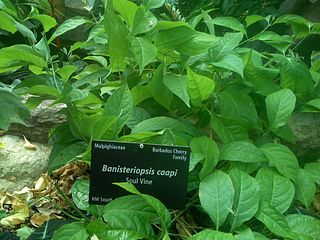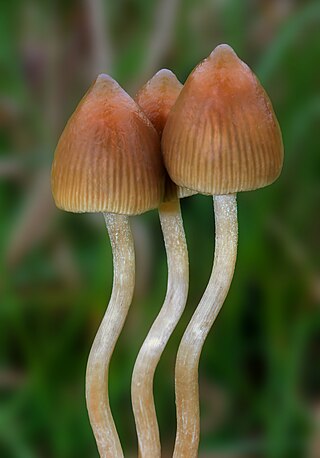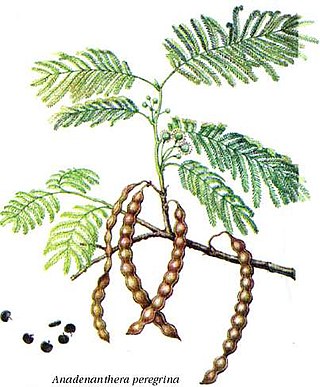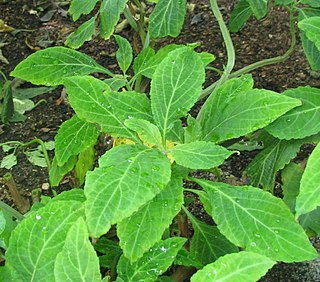
Datura is a genus of nine species of highly poisonous, vespertine-flowering plants belonging to the nightshade family (Solanaceae). They are commonly known as thornapples or jimsonweeds, but are also known as devil's trumpets or mad apple. Other English common names include moonflower, devil's weed, and hell's bells. All species of Datura are extremely poisonous and psychoactive, especially their seeds and flowers, which can cause respiratory depression, arrhythmias, fever, delirium, hallucinations, anticholinergic toxidrome, psychosis, and death if taken internally.

Psilocybin mushrooms, commonly known as magic mushrooms,shrooms, or broadly as hallucinogenic mushrooms, are a polyphyletic informal group of fungi that contain psilocybin, which turns into psilocin upon ingestion. The most potent species are members of genus Psilocybe, such as P. azurescens, P. semilanceata, and P. cyanescens, but psilocybin has also been isolated from approximately a dozen other genera, including Panaeolus, Inocybe, Pluteus, Gymnopilus, and Pholiotina.

Psilocybe is a genus of gilled mushrooms, growing worldwide, in the family Hymenogastraceae. Many species contain the psychedelic compounds psilocybin and psilocin.

Banisteriopsis caapi, also known as, caapi, soul vine, yagé (yage), or ayahuasca, the latter of which also refers to the psychedelic decoction made with the vine and a plant source of dimethyltryptamine, is a South American liana of the family Malpighiaceae. It is commonly used as an ingredient of ayahuasca, a decoction with a long history of its entheogenic use and holds status as a "plant teacher" among the Indigenous peoples of the Amazon rainforest.

Psilocybe semilanceata, commonly known as the liberty cap, is a species of fungus which produces the psychoactive compounds psilocybin, psilocin and baeocystin. It is both one of the most widely distributed psilocybin mushrooms in nature, and one of the most potent. The mushrooms have a distinctive conical to bell-shaped cap, up to 2.5 cm (1 in) in diameter, with a small nipple-like protrusion on the top. They are yellow to brown, covered with radial grooves when moist, and fade to a lighter color as they mature. Their stipes tend to be slender and long, and the same color or slightly lighter than the cap. The gill attachment to the stipe is adnexed, and they are initially cream-colored before tinting purple to black as the spores mature. The spores are dark purplish-brown en masse, ellipsoid in shape, and measure 10.5–15 by 6.5–8.5 micrometres.

Anadenanthera peregrina, also known as yopo, jopo, cohoba, parica or calcium tree, is a perennial tree of the genus Anadenanthera native to the Caribbean and South America. It grows up to 20 m (66 ft) tall, and has a thorny bark. Its flowers grow in small, pale yellow to white spherical clusters resembling Acacia inflorescences. It is an entheogen which has been used in healing ceremonies and rituals for thousands of years in northern South America and the Caribbean. Although the seeds of the yopo tree were originally gathered from the wild, increased competition between tribes over access to the seeds led to it being intentionally cultivated and transported elsewhere, expanding the plant's distribution through introduction to areas beyond its native range.

Bufotenin, also known as dimethylserotonin or as 5-hydroxy-N,N-dimethyltryptamine (5-HO-DMT), is a tryptamine derivative, more specifically, a dimethyltryptamine (DMT) analogue, related to the neurotransmitter serotonin. It is an alkaloid found in some species of mushrooms, plants and toads, especially the skin. It is also found naturally in the human body in small amounts.

Psilocybe tampanensis is a very rare psychedelic mushroom in the family Hymenogastraceae. Originally collected in the wild in a sandy meadow near Tampa, Florida, in 1977, the fungus would not be found in Florida again until 44 years later. The original Florida specimen was cloned, and descendants remain in wide circulation. The fruit bodies (mushrooms) produced by the fungus are yellowish-brown in color with convex to conic caps up to 2.4 cm (0.9 in) in diameter atop a thin stem up to 6 cm (2.4 in) long. Psilocybe tampanensis forms psychoactive truffle-like sclerotia that are known and sold under the nickname "philosopher's stones". The fruit bodies and sclerotia are consumed by some for recreational or entheogenic purposes. In nature, sclerotia are produced by the fungus as a rare form of protection from wildfires and other natural disasters.

The ancient Aztecs employed a variety of entheogenic plants and animals within their society. The various species have been identified through their depiction on murals, vases, and other objects.

Salvia divinorum, a psychoactive plant, is legal in most countries. Exceptions, countries where there is some form of control, include Australia, Belgium, Brazil, Canada, Denmark, Estonia, Finland, Germany, Iceland, Ireland, Italy, India, Japan, South Korea, Norway, Poland, United Kingdom, Ukraine, Spain, Sweden, Vietnam, Armenia and 33 states and territories of the United States.
Gastón Guzmán Huerta, a Mexican mycologist and anthropologist, was an authority on the genus Psilocybe.

Drug policy of California refers to the policy on various classes and kinds of drugs in the U.S. state of California. Cannabis possession has been legalized with the Adult Use of Marijuana Act, passed in November 2016, with recreational sales starting January of the next year. With respect to many controlled substances, terms such as illegal and prohibited do not include their authorized possession or sale as laid out by applicable laws.

Salvia divinorum is a species of plant in the sage genus Salvia, known for its transient psychoactive properties when its leaves, or extracts made from the leaves, are administered by smoking, chewing, or drinking. The leaves contain the potent compound salvinorin A and can induce a dissociative state and hallucinations.

The Pertusariales are an order of fungi in the class Lecanoromycetes, comprising 8 families, 31 genera, and over 600 species, many of which form lichens. This diverse group is characterized by complex taxonomic history and ongoing phylogenetic revisions. Originally proposed by Maurice Choisy in 1949 and later formally published by the lichenologists David L. Hawksworth and Ove Eriksson in 1986, Pertusariales has undergone significant reclassification due to molecular phylogenetics studies. The order includes well-known genera such as Pertusaria and Ochrolechia, as well as families like Megasporaceae and Icmadophilaceae.
The legal status of Salvia divinorum in the United States varies, with 29 states having completely banned it and others considering proposals for banning its use.

Cannabis in Louisiana is legal only for medicinal use; recreational possession of 14 grams or less is decriminalized punishable by a fine of no more than $100. Medicinal use is allowed with a physician's written recommendation for any debilitating condition. Prior to statewide decriminalization, possession of small amounts of marijuana was first decriminalized in the cities of New Orleans, Baton Rouge, and Shreveport.

Cannabis in Indiana is illegal for recreational use, with the exception of limited medical usage. Possession of any amount is a Class B misdemeanor, punishable by up to 180 days in prison and a fine of up to $1000.

Cannabis in New York has been legal for medical purposes under New York law since 2016, and recreational purposes since 2021. As of 2022, recreational cannabis is for sale legally in the state, only through state-approved dispensaries.

The movement to decriminalize psilocybin in the United States began in 2019 with Denver, Colorado, becoming the first city to decriminalize psilocybin in May of that year. The cities of Oakland and Santa Cruz, California, decriminalized psilocybin in June 2019 and January 2020, respectively. Washington, D.C., followed soon in November 2020, as did Somerville, Massachusetts, in January 2021, and then the neighboring Cambridge and Northampton in February 2021 and March 2021, respectively. Seattle, Washington, became the largest U.S. city on the growing list in October 2021. Detroit, Michigan, followed in November 2021.














